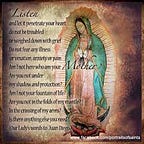The difference between faith and hope
I recently watched a speech by Dr Scott Hahn in which he describes how the theological virtue of faith is distinct from the theological virtue of hope, and how Martin Luther tried to combine the two, which isn’t possible. The following is my transcription of that speech for anyone who would rather read his most relevant quotes than watch the full speech:
The trials of faith aren’t proof that we might not be children of God, they’re proof that we are, that He’s disciplining us.
He’s putting us in over our heads to show us how weak we are so that we might discover how strong He is, if we let Him.
In this amazing encyclical, “Saved in Hope”, Pope Emeritus Benedict clarifies something really crucial. The definition of faith that you find in Hebrews 11:1 in the KJV is a bad translation. It says, “Faith is the assurance of things hoped for, the conviction of things not seen”. It’s derived not from the original Greek text, but from Martin Luther’s rejection of the plain sense of the text. Pope Benedict writes: “To Luther, who isn’t particularly fond of the letter to the Hebrews, the concept, the word used here- “substance”, meant nothing”.
What does Pope Benedict mean? That the definition of faith here is the substance of things hoped for, not merely the assurance. It’s not something that we’re just kind of sure that we’ll eventually get, it’s the substance of what we already possess. By faith, we’re united to God as our Father, to Christ His Son, to the power of the Holy Spirit. By faith we’re united to the saints. By faith we now share eternal life. By faith the Holy Trinity comes to dwell within us. It isn’t something that’s just far off but we’re certain to get it. Faith is the substance of things hoped for.
As a result, we have a different understanding of faith than Protestants. Pope Benedict says it rather gently: “This in itself isn’t incorrect, but it’s not the meaning of the text, because the Greek term used doesn’t have the subjective sense of conviction, but the objective sense of proof and substance”. He’s not denying that faith and hope go together, but he’s pointing out how Luther collapsed hope into faith. This becomes the basis for the Reformation and so much confusion, because what is the object of our faith? The Word of God. Whatever we find in the Word of God, we believe it because He has spoken and He can’t deceive or be deceived. We’re His children, and we trust Him more than we trust our own logic and science. That’s faith. Whatever we find in the Word of God, we know to be true, even if we can’t prove it, because faith is that proof. Faith unites us to that substance, and yet at the same time it unites us to the very substance of what it is we hope for.
For Luther, faith was the personal assurance of salvation. And so you sometimes find his descendants saying “Are you saved?” And you’ll say, “well, I’m baptized, I’m following Jesus as a disciple, I’m saved as a Catholic Christian, through the grace of God working through the sacraments, through the Holy Spirit, I’m being saved, I hope to be saved”.
They’ll say “No, do you have assurance? If you were to die tonight and go before God, and He were to ask you, why should I let you into Heaven, do you have total certainty that you will go to Heaven?” “Well, I have faith”. “No, you must be certain”.
What Pope Benedict points out is that you’ve just confused these two very distinct virtues. Faith knows to be true whatever God has spoken. Hope is what applies that to my own life. But Luther said “no, unless you know you’re saved, you’re not saved”. And so this notion of assurance is what caused the eclipse of hope. We as Catholics have the certainty of faith, that whatever God has revealed is true, but when it comes to our own salvation, it’s not the same thing. Why? Because nowhere in the Bible do I ever read “Scott Hahn’s name is written in the book of life”. If it was written in the scriptures, I would have the certainty of faith, because God’s word is the object of faith. What I do read is “whosoever believes shall not perish but shall have everlasting life”, but how do I know whether I believe? You know they say “once saved always saved” . .. if you don’t fall away. This is where the virtue of hope comes in. This is where the virtue of hope went out the window. Faith unites us to the substance, the reality of God’s own life, and yet hope is what operates through God’s own power.
